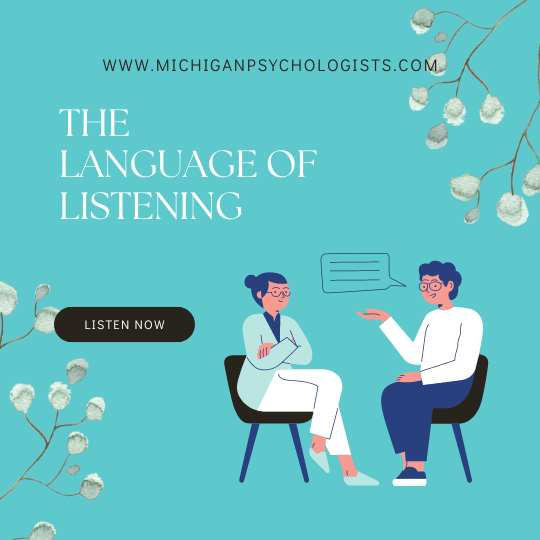The Language of Listening

Table of Contents
We live in a world that’s constantly shouting. Everyone has something to say, but few are willing to listen. Yet, for those healing from trauma, having someone listen to their stories and engage with their interests can be a powerful form of love and support. Let’s explore why listening is so potent and why counseling and therapy services, which are built on this principle, are so effective.
The Power of Listening
Listening might seem like a passive activity, but it’s anything but. When done correctly, listening is a dynamic, engaging process that can have profound effects on the speaker. Here’s why:
Validation: When someone listens to your stories, it validates your experiences. It says, “Your experiences matter, and so do you.” For trauma survivors, this validation can be incredibly healing.
Connection: Engaging with someone’s interests builds a connection. It creates a sense of shared experience and mutual understanding, which can be a lifeline for those who feel isolated by their trauma.
Emotional Release: Talking about traumatic experiences in a safe environment allows for emotional release. This catharsis is a crucial step in the healing process, helping to unburden the individual from the weight of their trauma.
Mechanisms Behind the Power of Listening
Now, let’s break down the mechanics of why listening is so effective:
1. Creates a Safe Space
Listening without judgment creates a safe space where individuals feel free to express themselves. This safety is essential for trauma survivors, who often struggle with feelings of vulnerability and fear of judgment.
2. Enhances Self-Awareness
When someone listens to us, it prompts self-reflection. As we recount our stories and articulate our thoughts, we gain insights into our own experiences and emotions. This enhanced self-awareness is a key component of healing.
3. Fosters Empathy
Listening fosters empathy, not just from the listener but also within the speaker. As trauma survivors share their stories, they start to see their experiences from a different perspective, often leading to greater self-compassion.
Why Counseling and Therapy Are So Effective
Counseling and therapy services are built on the foundation of active listening and engagement. Here’s why they work so well:
1. Professional Training
Therapists and counselors are trained to listen effectively. They know how to create a safe, non-judgmental space, ask the right questions, and guide the conversation in a way that promotes healing.
2. Structured Environment
Therapy provides a structured environment where individuals can explore their thoughts and feelings in depth. This structure is especially beneficial for trauma survivors, who may feel overwhelmed by their emotions.
3. Personalized Approach
Therapists tailor their approach to each individual’s needs. This personalized attention ensures that the therapy is relevant and effective, addressing the unique aspects of the person’s trauma and their healing process.
Key Steps to Effective Listening
If you want to harness the power of listening to support someone healing from trauma, here are some key steps:
Be Present: Give your full attention. Put away distractions and focus on the person speaking. Your presence is a powerful signal that you care.
Listen Without Judgment: Avoid passing judgment on what the person is sharing. Accept their experiences and feelings as valid and important.
Show Empathy: Empathy is about understanding and sharing the feelings of another. Show that you care and that you’re there to support them.
Engage with Interests: Take an interest in what matters to them. Whether it’s a hobby, a passion, or a particular subject, engaging with their interests shows that you value them as a person.
Ask Open-Ended Questions: Encourage deeper conversation by asking open-ended questions. This helps the person explore their thoughts and feelings more fully.
Reflect and Summarize: Reflecting back what you’ve heard and summarizing key points shows that you’re truly listening and helps the person feel understood.
Listening is more than just hearing words. It’s about creating a connection, providing validation, and fostering empathy. For those healing from trauma, having someone listen to their stories and engage with their interests is a powerful form of love and support. It’s no wonder that counseling and therapy, which are built on these principles, are so effective.
So next time someone shares their story with you, remember the power you hold simply by listening. You might just be offering them the greatest gift of all – the gift of feeling seen, heard, and valued. And in a world that’s constantly shouting, that’s a rare and precious thing.